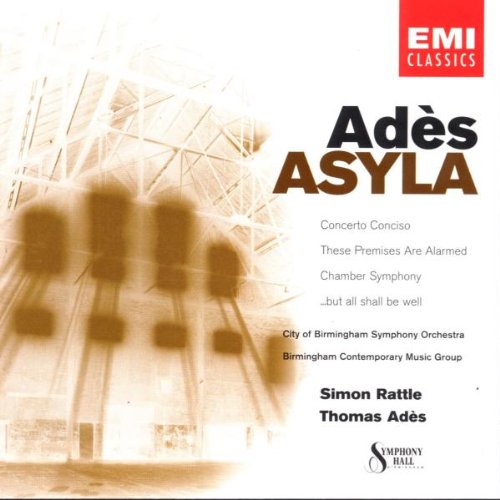Adès Chamber & Orchestral Works
View record and artist detailsRecord and Artist Details
Composer or Director: Thomas Adès
Genre:
Orchestral
Label: EMI
Magazine Review Date: 7/1999
Media Format: CD or Download
Media Runtime: 61
Mastering:
DDD
Catalogue Number: 556818-2

Tracks:
| Composition | Artist Credit |
|---|---|
| Asyla |
Thomas Adès, Composer
City of Birmingham Symphony Orchestra Simon Rattle, Conductor Thomas Adès, Composer |
| Concerto conciso |
Thomas Adès, Composer
Birmingham Contemporary Music Group Thomas Adès, Composer Thomas Adès, Piano |
| These Premises are Alarmed |
Thomas Adès, Composer
City of Birmingham Symphony Orchestra Thomas Adès, Composer Thomas Adès, Conductor |
| Chamber Symphony |
Thomas Adès, Composer
Birmingham Contemporary Music Group Thomas Adès, Composer Thomas Adès, Conductor |
| ...but all shall be well |
Thomas Adès, Composer
City of Birmingham Symphony Orchestra Thomas Adès, Conductor Thomas Adès, Composer |
Author: Michael Oliver
In not much more than 18 months, EMI has now recorded 19 works by Thomas Ades, including his full-length opera, Powder Her Face (9/98). The welcomings of a new and outstanding talent have generally been warmly enthusiastic, but there seems also to have been an adverse reaction: of course and understandably from those who see other gifted young (and not so young) composers receiving far less attention and publicity, but there have also been a few cries of ‘But surely he isn’t as good as all that?’ and ‘Why all this fuss about a merely fluent talent?’. My reply to the former would be a simple riposte of ‘Yes he is’; to the latter, if I had the space and you had the patience, several pages more in sorrow than in anger (well, a bit more) about how far British music has progressed since it dismissed Benjamin Britten as too clever by half.
Now then. This latest CD, though not the first I would recommend to anyone who wants cast iron proof of Ades’s significance, is uncommonly interesting. It includes the Chamber Symphony, the work that first aroused interest in him all of ten years ago when he was 18, set alongside Asyla, a recent un-chamber symphony and his first work for full orchestra. The progression between them is remarkable: the Chamber Symphony is, if you like, both clever and fluent, but it has both real invention and real economy, and its use of jazz elements is neither patronizing nor culinary. Maybe its last movement adds little of consequence to the preceding three, but Asyla genuinely grows from the grave, rather Britten-ish horn line that sets it going through the strong drama of the central movements to the almost Sibelian climax of the finale. Despite the two composers I have mentioned Ades’s own voice is clearly audible throughout, elegant, coolly intelligent but urgent.
These Premises are Alarmed, a sinewy toccata of bright colour and urgent energy, was written for the opening of the Bridgewater Hall in Manchester. At four minutes it makes less impact than it should in the middle of a CD (play it first). In the Concerto conciso Ades perhaps takes his pleasure in simple intervals and brief motives a little too far: the finale seems skinny, and I’m not too sure about the central movement. However,… but all shall be well is something else again. It develops abundant, generous, earnest melody from a pair of simple phrases in an impressively sustained argument that reaches a powerful and satisfying climax. Ades is continuing to grow, that’s the thing, and although I’ve now heard most of what he’s written I eagerly anticipate what he’ll write next. Fine performances, admirably recorded.'
Now then. This latest CD, though not the first I would recommend to anyone who wants cast iron proof of Ades’s significance, is uncommonly interesting. It includes the Chamber Symphony, the work that first aroused interest in him all of ten years ago when he was 18, set alongside Asyla, a recent un-chamber symphony and his first work for full orchestra. The progression between them is remarkable: the Chamber Symphony is, if you like, both clever and fluent, but it has both real invention and real economy, and its use of jazz elements is neither patronizing nor culinary. Maybe its last movement adds little of consequence to the preceding three, but Asyla genuinely grows from the grave, rather Britten-ish horn line that sets it going through the strong drama of the central movements to the almost Sibelian climax of the finale. Despite the two composers I have mentioned Ades’s own voice is clearly audible throughout, elegant, coolly intelligent but urgent.
These Premises are Alarmed, a sinewy toccata of bright colour and urgent energy, was written for the opening of the Bridgewater Hall in Manchester. At four minutes it makes less impact than it should in the middle of a CD (play it first). In the Concerto conciso Ades perhaps takes his pleasure in simple intervals and brief motives a little too far: the finale seems skinny, and I’m not too sure about the central movement. However,
Discover the world's largest classical music catalogue with Presto Music.

Gramophone Digital Club
- Digital Edition
- Digital Archive
- Reviews Database
- Full website access
From £8.75 / month
Subscribe
Gramophone Full Club
- Print Edition
- Digital Edition
- Digital Archive
- Reviews Database
- Full website access
From £11.00 / month
Subscribe
If you are a library, university or other organisation that would be interested in an institutional subscription to Gramophone please click here for further information.




